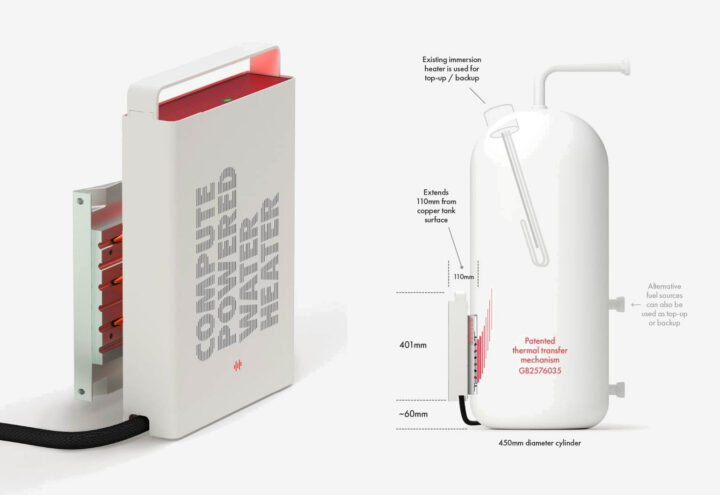Heata, which began as an innovation project with British Gas, is a UK company that connects a server to your hot water cylinder and provides hot water to the house master for free up to 4.8 kWh per day, and at least 2.5 kWh as per contractual obligations.
Companies spend millions of dollars to cool the servers hosted in their data centers and most of that heat is completely wasted. So Heata decided to create a win-win solution that lowers their cooling cost and provides free hot water to whoever has their server installed in their house.
The installation process is said to be tested and approved by British Gas so you don’t lose your hot water cylinder warranty, and the heat transfer mechanism is patented as well under the UK patent GB2576035. A technician would come to cut the insulation and attach a thermal bridge to the cylinder. The installation takes 30 minutes, and if you decide you don’t want to host the server after all, it can be removed and sealed without losing the warranty.
There are some limitations as it only works with vented 425mm to 450mm diameter cylinders and you also need to have enough space around the cylinder (401 x 281 x 110mm) to install the server. Heata says each of their units uses 56% less electricity and saves 1 tonne of carbon per year against a typical data center plus hot water heating. It also saves up to £200 / year (~$240 US) for the typical household, and it can deliver up to 80% of an average UK household’s hot water energy consumption.
While you do get free hot water, you won’t have access to the server, as they sell the compute capabilities to their customer who gets some ESG (Environmental, Social, Governance) points in the process. I also wondered if they made use of your broadband access, in which case it could be an issue, but the answer is no, as we are told the server uses its own connection which will either be its own dedicated fiber line or a 4G/5G connection.
It looks pretty good on paper as long as they take care of potential downsides like a water leak due to a botched installation. If you happen to live in the UK with a hot water cylinder that matches the requirements, you may apply to the Heata trial. The installation includes an electric meter just for the server, and the electricity bill will be paid by Innovate UK and Heata. The rest of the world can watch how this little experiment goes and follows their step if everything works well…

Jean-Luc started CNX Software in 2010 as a part-time endeavor, before quitting his job as a software engineering manager, and starting to write daily news, and reviews full time later in 2011.
Support CNX Software! Donate via cryptocurrencies, become a Patron on Patreon, or purchase goods on Amazon or Aliexpress







It was really not needed to patent such a crappy mechanism that requires to permanently ruin your water heater, they could instead have designed a cubic aluminum enclosure with two pipes storing 20L of water that has to be inserted on the circuit before the water heater, so that it pre-heats water and saves the same amount of energy each time some hot water is used.
In France there is a cloud hosting company (whose name I forgot) who installs heaters for free in appartments. These ones contain one or a few servers that radiate some heat in the room. You can decide to heat more or less, and they assign more or less load to them, there’s just quite some latency before you can adjust the heat. It provides free heat to some people, with free hosting for the hosting provider (no room nor cooling to pay for) and even no physical security to deal with. That’s a real win/win.
Qarnot Computing => qarnot.com/en
Yeah indeed it’s this one. I found the article I read back then (in French): https://www.20minutes.fr/societe/4015060-20221216-crise-energie-bailleur-remplace-radiateurs-data-centers-chauffe-gratuitement-locataires
You can just patch the insulation up but Yeap the design is limited at best .
We tried communal heating in UK but when main boiler went down everyone freezes. Good on paper, crap in practise
Even Manchester University wasted the server heat ..oh and fridges in big super stores produce great heat as well.
I don’t see the pretty where it runs the water heater, it says you can remove it without issue if you don’t want it. The article doesn’t go into specifics, but if they are using a simple plate heat exchanger, that doesn’t impact the storage tank at all
Twerps should install two or a bigger server. Or how about a seam engine electric generators.
Might try this offer as my boiler recently died.. need a tank though…
Good use for all those hot pies too 🙈🙉🙊
This is small, several places are doing data center scale heat recovery.
data center district heating…
Sounds dodgy. OK, I provide cooling and get a bit of water heating, but cooling is NOT enough for the server to function.
Separate fibre to each home? A bit expensive, in’it? 4G/5G? In a basement? And where it draws power from? A separate electricity meter will be installed?
Other than that, as far as I remember, hot water should be heated to 60 grad Celsius. What kind of heat sink is that for a poor server if it is already 60 grad hot???
Server powered steam electric power generator, who needs nuclear or coal and gas. Just wind turbines for good luck 🙊🙉🙈🤪😁🤣
I think you just discovered infinite energy source!
Computer heat produces steam, that gets converted to electricity that powers computers to produce more heat….. Ahahaha… (Since people take everything super serious I have to note that I’m obviously joking)
A Dutch company “nerdalize” has tried this.
2015 https://www.rtlnieuws.nl/economie/tech-business/artikel/32666/delftse-startup-hot-gratis-verwarming-huis-met-servers
Bankrupt in 2019:
https://tweakers.net/nieuws/147396/nederlands-bedrijf-dat-huizen-door-servers-wilde-verwarmen-is-failliet.html
Not surprised. This remains a niche market. Also in plenty of buildings heated by circulating water, the user pays a ratio of the global cost, whether they heat or not. Here the business model consists, like with roof solar panels, to sell a promise of long-term savings after an initial investment. When you factor in the point above, it’s likely that plenty of people will not want to make the effort of trying this. Another difficulty is that for this to work, you have to find demand for cloud at the same time as you find locations to install the servers. If hosted customers have to wait too long they give up. And if you have to run the servers in busy-loops or mining to deliver heat because nobody wants to use their CPUs, that’s not affordable either.
I wish there was an off the shelf Bitcoin miner that made hot water. I’m sure there will be soon though.
hestiia.com
Not off the shelf and not hot water – just heating
https://blog.haschek.at/2021/how-i-heat-my-home-by-mining.html
???